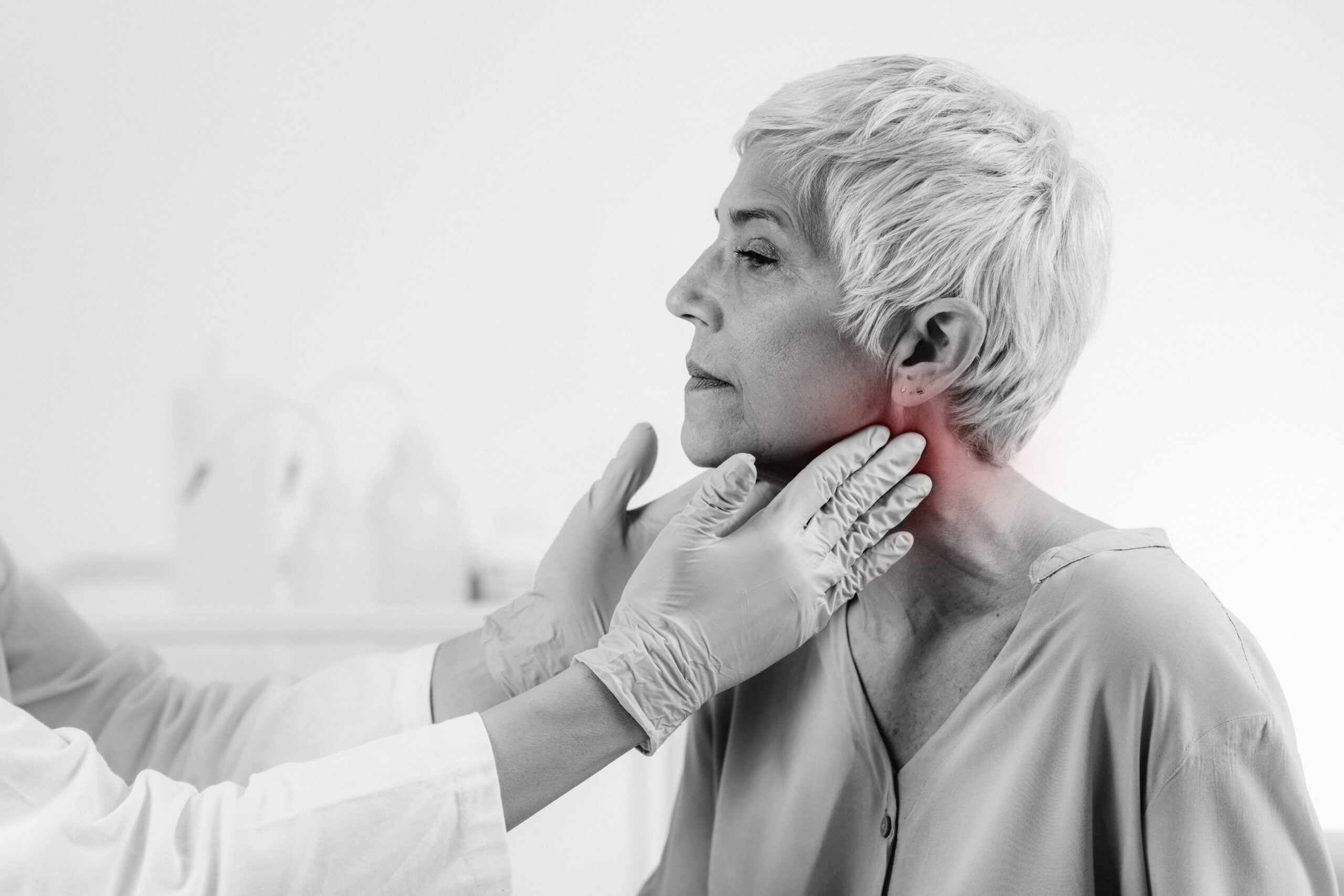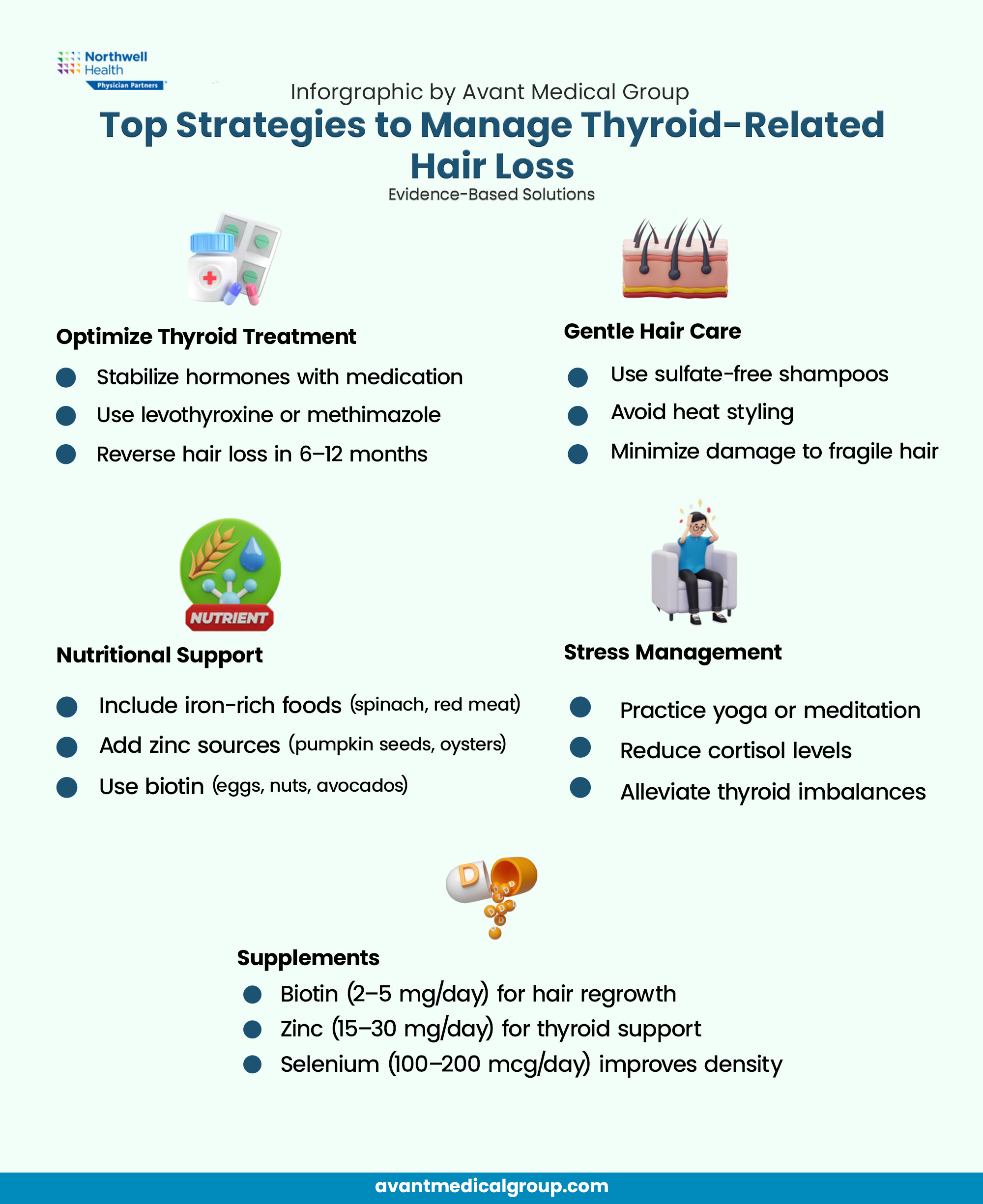
Having a problem with thin hair or sudden loss of hair? At Avant Medical Group, we realize that thyroid disorders and hair loss are usually closely connected. In this blog, we will discuss how thyroid conditions cause hair loss, hair loss and thyroid problems, and how thyroid issues and hair loss influence your hair health with some evidence-based facts and solutions. Our thyroid disorders programs offer specialized treatment to these issues and help you live a balanced life.
Understanding the Link Between Thyroid Disorders and Hair Loss
The malfunction of the thyroid gland that causes thyroid diseases, including hypothyroidism (underactive thyroid) and hyperthyroidism (overactive thyroid), causes hormone imbalance, which affects different processes in the body, including hair growth. The loss of hair is a widespread sign, and up to 50 percent of thyroid patients experience this loss in the form of diffuse thinning or split hair. Thyroid problems hair loss, unlike genetic hair loss, is usually treatable and reversible. Our thyroid experts assist with diagnosing and treating these ailments with the goal of regaining hair health
How Thyroid Disorders Cause Hair Loss

Hair follicle cycles are controlled by thyroid hormones (T3 and T4). Lack of balance negatively affects this process causing the loss of hair and problems with thyroid. Here’s how:
- Hypothyroidism: This condition is connected to insufficient thyroid hormones, which slow down the metabolism leading to slow hair growth, and flaky, dry hair. According to a 2018 study, 40 percent of patients with hypothyroidism experience thinning of the hair because of a prolonged telogen (resting) phase within the hair follicles.
- Hyperthyroidism: Thyroid hormones increase the rate of hair growth, resulting in premature loss of such hair. Studies show that up to 30 percent of hyperthyroid patients complain of noticeable hair loss.
- Autoimmune Thyroid Conditions: Hashimoto thyroiditis and Graves disease, both common causes of thyroid dysfunction, may cause alopecia areata, an autoimmune disease of the hair, in 3-6 percent of cases.
- Drug Interactions: The initial stages of taking thyroid hormones like levothyroxine can also lead to initial loss of hair which normally clears after 3-6 months.
Top Strategies to Manage Thyroid-Related Hair Loss

To beat off competition such as BTF, PMC, Healthline, and Cleveland Clinic, we have developed evidence-based solutions to tackle thyroid disorders and hair loss, and organized them into an easier to use format.
- Maximize Thyroid Therapy: Adequate dosing of medicine (e.g., levothyroxine, in hypothyroidism, or methimazole, in hyperthyroidism) results in stabilization of the hormones, which frequently reverses hair loss after 6-12 months. It is imperative to test thyroid functions (TSH, T3, T4) regularly.
- Nutritional Support: Zinc, biotin, and iron deficiency compound the nutritional problems of thyroid diseases, leading to loss of hair. According to a 2020 study, 25 percent of women with hypothyroidism shed their hair due to low ferritin levels. Include:
- Very high in iron: Spinach, red meat, lentils.
- Sources of zinc: Pumpkin seeds, oysters.
- Biotin: Eggs, nuts, avocados.
- Supplements: 2-5mg/day, zinc (15-30mg/day), Selenium (100-200mcg/day): Biotin is a vitamin supplement that is needed in the thyroid and in hair growth. A 2019 trial demonstrated that selenium increased hair density in 15 percent of patients with Hashimoto.
- Gentle Hair Care: Use sulfate free shampoos and do not heat style hair to minimize damage to frail hair associated with hair loss and thyroid problems.
- Stress management: Stress increases thyroid malfunction as well as hair loss. Cortisol amelioration of thyroid problems can be reduced by such means as yoga or even meditation.
When to Seek Professional Help
When the loss of hair continues even after treatment of thyroid disorders, refer to our thyroid specialists. In-depth thyroid screening, blood study and ultrasound are all provided to identify other underlying conditions like autoimmune disorders or nutrient deficiencies. We work together with dermatologists to deal with complex cases of alopecia areata.
Lifestyle Tips to Support Thyroid and Hair Health
These lifestyle changes should be used on top of medical treatment:
- Balanced Diet: This is all about a balanced diet with high amounts of anti-oxidants (berries, leafy greens) to keep the thyroid glands working and the hair follicles healthy.
- Exercise: Moderate exercise (30 minutes, 5 days/week) will improve the circulation that facilitates hair growth.
- Get rid of Toxins: reduce exposure to an endocrine disruptant (ex: BPA in plastics), worsens thyroid issues, loss of hair.
- Avoid toxins: decrease the exposure to endocrine disruptors (ex: BPA in plastics), which is exacerbated by thyroid problems, hair loss.
Read more about our comprehensive view on our services page.
How Avant Medical Group Can Help
At Avant Medical Group, our thyroid disorders services provide personalized care, including hormone therapy, nutritional counseling, and ongoing monitoring. We empower you to manage hair loss and thyroid issues with tailored plans that address both symptoms and root causes, improving your quality of life.
Conclusion
Thyroid diseases and loss of hair may be very painful, however, through treatment, loss of hair can be recovered. The best way to fight thyroid issues is by optimizing thyroid activity, overcoming nutrient deficiencies, and engaging in healthy lifestyle choices. At Avant Medical Group, we are committed to ensuring that we guide you through this process in a professional manner and with personalized solutions
Is Your Thyroid Causing Hair Loss? Get to the Root of the Problem!
Restore your hair and hormonal balance. Contact us now or book an appointment online for specialized thyroid care!
📞 +212-245-6893
📍 233 Broadway Suite 2750 New York, NY 10279
Frequently Asked Questions (FAQs)
Answer: Thyroid hormone imbalances interfere with the hair follicle cycle, causing diffuse thinning or shedding in up to 50% of patients
Answer: Yes, levothyroxine and other medications have been associated with short-term thinning or shedding in 10-20% of patients, which usually resolves within 3-6 months.
Answer: Biotin, zinc, and selenium are all helpful with hair regrowth and thyroid function, but please consult with one of our thyroid specialists before starting.
Answer: With careful and correct treatment for thyroid with proper diet and nutrition, patients typically start to see hair regrowth in 6-12 months, which varies according to the severity of the disorder.
Answer: We have a thyroid disorders clinic that can offer hormone replacement therapy and personal consultation for nutrition and adequate comprehensive evaluation.
